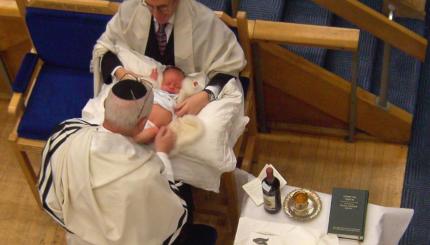Commentary on Parashat Tazria, Leviticus 12:1 - 13:59
Between the laws of kashrut and the laws about people with leprosy we find a snippet of Torah that discusses the laws of childbirth. As a birth worker, this portion is of particular interest to me. And yet, I can’t help but notice that childbirth, and a woman’s role in the literal birthing of the Jewish people, is only awarded one chapter of this Torah portion.
Childbirth in and of itself is a mysterious, powerful and amazing force of nature. The current “debate” about medicated or non-medicated birth aside, the very fact that our bodies create and sustain life is mind-boggling. Even more so when you think about what birth must have looked, smelled and sounded like in biblical times. Perhaps it’s my yearly re-read of Anita Diamant’s bestselling novel “The Red Tent” — a retelling of the story of Dinah from the Bible — but I imagine the very essence of divine feminine power when I think of our foremothers surrounded by aunties, grandmothers, sisters, mothers and cousins roaring the Jewish people to life behind the sacred flaps of the tents women were sent to during times of our blood mysteries.
In chapter 12 of Leviticus we learn that after a woman gives birth she is rendered unclean for a period of time determined by the gender of her child. A woman who gives birth to a male child will remain in a state of impurity for 33 days while a woman who gives birth to a female child will remain in a state of impurity for 66 days, double the time. This time, similar to niddah — the period during and after menstruation, when a woman is considered ritually impure — has been adjusted for today so that today a woman who gives birth to a male child for seven days, 14 days for a girl. In the same Torah portion, in Leviticus 13, we find the laws of circumcision before moving into the laws around a person with leprosy.
Why this difference of time for children of differing sexes, and what does it mean that we squish birthing women in between other “sins” and unpleasant things like eating animals that crawl on the earth and leprosy? I think this has a to do with the rabbis’ limited understanding of birth, and leprosy for that matter. In both instances the person is removed from the population for a period of time until he or she is determined to be clean again in an effort to keep the people clean and free to worship. It is also of interest that the word tzaraat is often translated to leprosy, though some rabbis interpret it to mean a skin disorder that occurs when the affected person gossips.
With your help, My Jewish Learning can provide endless opportunities for learning, connection and discovery.
In the summer of 2016 while studying at Pardes, an egalitarian yeshiva in Jerusalem, I took a course entitled “Women in Judaism: Permitted But Prohibited.” Throughout the course of the summer we sifted through areas of Torah and Talmud that seemed to contradict what a woman ritually was permitted to do but prohibited from doing based on a myriad of things including local customs of the time and the thoughts and experiences of the rabbis and men. At issue was everything from whether or not women could wear pants to whether she could wrap tefillin. It was during this study of text through feminist eyes that I gained better insight to the idea of being “unclean.” While I can’t for the life of me justify the idea of being unclean or impure simply as a result of bodily functions, the idea as I understand it is less about the persons themselves being damaged or dirty, but being unfit to perform the mitzvot, a ritual impurity. For example if a woman is niddah, certain religious obligations aren’t necessary for her to perform.
Leviticus has always been one of the more difficult texts of Torah for me to relate to. It seems to be nothing more than endless lists of outdated and discriminatory regulations that have little significance today. Does my Judaism truly depend on whether or not I wear two different fabrics? And yet it is in these ancient rules that we find some of our most time-honored traditions as a people. I wonder what would happen if we looked at our tradition as a way of honoring difference; the differences of the sexes, of food, of diseases of the skin, as a way to appreciate the sense of awe that is difference. And what would it mean if our differences weren’t unclean or impure, but sanctified and made holy.
tefillin
Pronounced: tuh-FILL-in (short i in both fill and in), Origin: Hebrew, phylacteries. These are the small boxes containing the words of the Shema that are traditionally wrapped around one's head and arm during morning prayers.
niddah
Pronounced: nee-DAH, or NEE-duh, Origin: Hebrew, family purity laws governing the separation of husband and wife during and for 10 days following the woman's menstruation.
mitzvah
Pronounced: MITZ-vuh or meetz-VAH, Origin: Hebrew, commandment, also used to mean good deed.
lashon hara
Origin: Hebrew, literally "evil tongue," slanderous speech prohibited in the Torah.
kashrut
Pronounced: kahsh-ROOT, Origin: Hebrew, the Jewish dietary laws.



